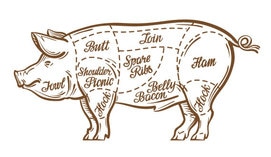 By Jennifer Williams, Director of the Isle of Wight County Museum For survival, every culture develops methods of curing food to prevent deterioration. From the bounty supplied by the Chesapeake Bay and eastern woodlands, the Virginia Indians smoked and stored game and fish for the winter months. Fish was smoked where it was caught and transported back to villages while venison, bear and other game hung in the tops of houses so that smoke from the fires preserved the meat. These techniques were observed by some of the first English settlers to arrive in Virginia. Swine, brought to the New World by Europeans, flourished in North America. Practically the perfect colonist, pigs are a relatively easy animal to raise, and they became a staple for most farmers by the 17th century. For the colonists, however, ham was the perfect food for export. In the New World, counties and towns grew as a result of the trade and commerce that sailed to and from its shores. Wharves and warehouses were built, and vessels sailed to and from foreign and domestic ports bringing with them news and various imports such as sugar, spices, chocolate, coffee, tea and liquor. Merchants, who maintained close ties with other seaports, sold these items in their stores and helped facilitate the export of goods such as tobacco, tar, pitch, turpentine, wood, shingles and, of course, ham. This trading system fueled the New World’s economic engine. Throughout the years, the business of ham became quite large. Industrial smokehouses replaced smaller farm and business fixtures, and numerous companies – some with names still recognizable today - gave their names to ham. Today along the Salty Southern Route, we can see and taste the influence of this history in salt and hardwood-smoked dry-cured hams, which keep indefinitely and without refrigeration.
1 Comment
|
The Salty Southern Routeis a joint tourism effort of the towns of Franklin and Smithfield, Isle of Wight, Southampton, Surry and Sussex Counties, and the city of Suffolk, Virginia. Archives
June 2024
|
|

 RSS Feed
RSS Feed

